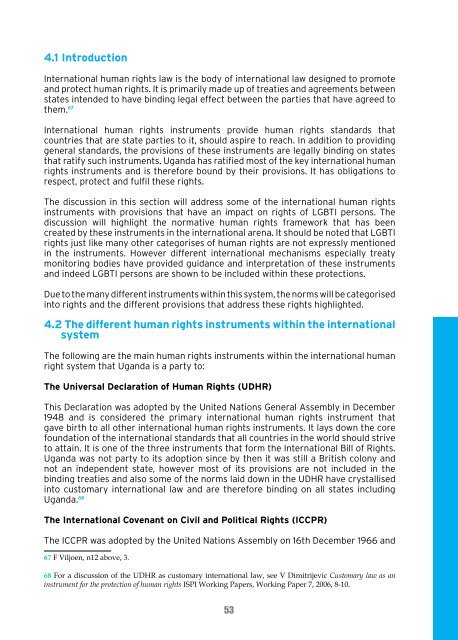PERSONS IN UGANDA
4Tks5WfQb
4Tks5WfQb
You also want an ePaper? Increase the reach of your titles
YUMPU automatically turns print PDFs into web optimized ePapers that Google loves.
4.1 Introduction<br />
International human rights law is the body of international law designed to promote<br />
and protect human rights. It is primarily made up of treaties and agreements between<br />
states intended to have binding legal effect between the parties that have agreed to<br />
them. 67<br />
International human rights instruments provide human rights standards that<br />
countries that are state parties to it, should aspire to reach. In addition to providing<br />
general standards, the provisions of these instruments are legally binding on states<br />
that ratify such instruments. Uganda has ratified most of the key international human<br />
rights instruments and is therefore bound by their provisions. It has obligations to<br />
respect, protect and fulfil these rights.<br />
The discussion in this section will address some of the international human rights<br />
instruments with provisions that have an impact on rights of LGBTI persons. The<br />
discussion will highlight the normative human rights framework that has been<br />
created by these instruments in the international arena. It should be noted that LGBTI<br />
rights just like many other categorises of human rights are not expressly mentioned<br />
in the instruments. However different international mechanisms especially treaty<br />
monitoring bodies have provided guidance and interpretation of these instruments<br />
and indeed LGBTI persons are shown to be included within these protections.<br />
Due to the many different instruments within this system, the norms will be categorised<br />
into rights and the different provisions that address these rights highlighted.<br />
4.2 The different human rights instruments within the international<br />
system<br />
The following are the main human rights instruments within the international human<br />
right system that Uganda is a party to:<br />
The Universal Declaration of Human Rights (UDHR)<br />
This Declaration was adopted by the United Nations General Assembly in December<br />
1948 and is considered the primary international human rights instrument that<br />
gave birth to all other international human rights instruments. It lays down the core<br />
foundation of the international standards that all countries in the world should strive<br />
to attain. It is one of the three instruments that form the International Bill of Rights.<br />
Uganda was not party to its adoption since by then it was still a British colony and<br />
not an independent state, however most of its provisions are not included in the<br />
binding treaties and also some of the norms laid down in the UDHR have crystallised<br />
into customary international law and are therefore binding on all states including<br />
Uganda. 68<br />
The International Covenant on Civil and Political Rights (ICCPR)<br />
The ICCPR was adopted by the United Nations Assembly on 16th December 1966 and<br />
67 F Viljoen, n12 above, 3.<br />
68 For a discussion of the UDHR as customary international law, see V Dimitrijevic Customary law as an<br />
instrument for the protection of human rights ISPI Working Papers, Working Paper 7, 2006, 8-10.<br />
53


